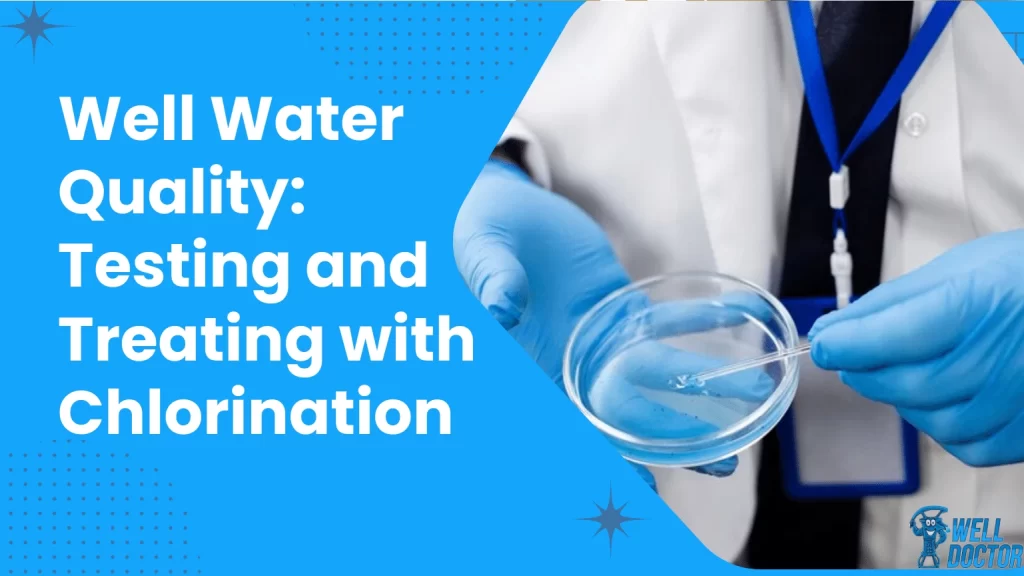Well Water Quality: Testing and Treating with Chlorination

Ensuring the safety and quality of well water is a paramount concern for homeowners who rely on private wells for their drinking water.
Unlike municipal water supplies, well water is not regulated, making it the responsibility of the homeowner to test and treat their water regularly. Chlorination is a widely used and effective method for treating well water, but understanding when and how to use it is crucial for maintaining water quality and health.
Why Is It Essential To Test Well Water Quality For Chlorination Treatment?
Testing well water quality is the first step in determining whether chlorination is necessary. Since well water comes directly from the ground, it can be contaminated with various substances, including bacteria, viruses, and chemicals, posing serious health risks.
Regular testing helps identify these contaminants and provides the information needed to adjust the chlorination process effectively. Without proper testing, there’s no way to know if the water is safe for consumption or if the treatment works as intended.
Testing should be conducted at least annually or more frequently if there are known contamination issues in the area or changes in water taste, odor, or appearance.
What Are The Common Contaminants In Well Water That Can Be Treated With Chlorination?
Chlorination can effectively neutralize a wide range of contaminants in well water, making it safer for consumption. The most common targets for chlorination include:
- Bacteria and Viruses: These microorganisms can cause a variety of illnesses. Chlorine is highly effective at killing or deactivating these pathogens, thereby preventing waterborne diseases.
- Iron and Manganese: Although not health hazards, high levels of these minerals can affect water taste, cause staining, and lead to plumbing issues. Chlorination oxidizes these elements, making them easier to filter out.
- Hydrogen Sulfide: Known for its rotten egg smell, chlorine can neutralize this gas, improving water smell and taste.
By addressing these contaminants, chlorination significantly improves the safety and aesthetics of well water.
How Does Chlorination Effectively Improve The Quality Of Well Water?
Chlorination works by adding chlorine, a powerful disinfectant, to well water. Chlorine reacts with water to form hypochlorous acid, which attacks the enzymes inside bacteria and viruses, rendering them harmless. This process, known as oxidation, also breaks down iron, manganese, and hydrogen sulfide, allowing these elements to be filtered out more easily.
The effectiveness of chlorination depends on several factors, including the concentration of chlorine, contact time with the water, and the presence of contaminants that can react with and reduce the available chlorine.
Properly adjusted, chlorination systems can maintain a residual chlorine level in the water, ensuring continuous disinfection and protection against recontamination as water moves through the distribution system.
Are There Any Potential Health Risks Associated With Chlorination Of Well Water?
While chlorination is generally safe and effective, there are potential health risks associated with improper use. Over-chlorination can lead to elevated levels of disinfection byproducts (DBPs) like trihalomethanes (THMs) and haloacetic acids (HAAs), which are formed when chlorine reacts with natural organic matter in the water. Some studies have linked long-term exposure to high levels of DBPs with increased risk of cancer and reproductive issues.
To minimize these risks, it’s crucial to maintain proper chlorine levels, regularly test the water for microbial contaminants and chlorine concentration, and consider additional treatment methods, such as activated carbon filtration, to remove any resulting DBPs.
Chlorination is a valuable tool for improving well water quality, but it must be used judiciously. Regular testing is essential to determine contaminants’ presence and levels and adjust the chlorination process accordingly.
By understanding the common contaminants that can be treated with chlorination, how it works, and the potential health risks, homeowners can ensure their well water is safe, clean, and pleasant to use. Safe and effective water treatment protects health and enhances the overall quality of life for those relying on well water for their daily needs.
Choose Well Doctor LLC for Superior Well Water Treatment
At Well Doctor LLC, we are deeply committed to ensuring that your well water is safe to drink, tastes great, and is free from any odors or contaminants that can affect your family’s health and your home’s plumbing system. Our expertise in well water testing and treatment, particularly chlorination, sets us apart and makes us your best choice for all your well water needs.
Unmatched Expertise in Water Quality Improvement
Our team of certified professionals has extensive experience in identifying and treating all types of well water issues. We understand the science behind water quality and use the latest techniques and equipment to ensure your water is treated effectively.
When you choose Well Doctor LLC, you’re not just getting a service provider; you’re getting a partner who cares about the quality of your water as much as you do.
Customized Chlorination Solutions Tailored to Your Needs
We recognize that every well is unique, with its challenges. That’s why we offer customized chlorination solutions tailored to the specific needs of your well. Whether dealing with bacterial contamination, iron, manganese, or hydrogen sulfide, we design treatment plans to address your water’s particular issues. We aim to provide a long-term solution, ensuring your water remains clean, safe, and pleasant.
Committed to Your Health and Safety
At Well Doctor LLC, your health and safety are our top priorities. We strictly adhere to all guidelines for safe chlorination practices to minimize any potential health risks associated with chlorine treatment.
Our team regularly undergoes training to stay updated on the latest water treatment standards and health advisories. We also offer a range of additional treatment options, such as filtration systems, to remove any chlorination byproducts and ensure your water is as healthy as possible.
Frequently Asked Questions
Q: How much does it cost to get my well water tested and treated by Well Doctor LLC?
A: The cost of well water testing and treatment can vary depending on the complexity of the issues and the solutions required. Generally, our testing services start at $100, with chlorination treatments ranging from $500 to $2,000, depending on the system’s size and the specific treatment needed. We provide transparent pricing and will discuss all costs with you upfront.
Q: How often should I have my well water tested?
A: We recommend testing your well water for basic contaminants at least once a year. If you suspect any changes in water quality or have had recent issues with contamination, more frequent testing may be necessary.
Q: Can Well Doctor LLC help if I notice a chlorine taste or smell in my water?
A: Absolutely. Suppose you’re experiencing a chlorine taste or smell. We can adjust your treatment system or recommend additional filtration solutions to remove excess chlorine and ensure your water tastes fresh and clean.
Ensure a Safe & Clean Well Water With Us
If you’re concerned about the quality of your well water or want to learn more about our chlorination treatment services, Well Doctor LLC is here to help. Our team of experts is ready to provide you with the testing, treatment, and peace of mind you deserve. Don’t wait until water quality issues affect your health or your home.
Contact us today to schedule a consultation and take the first step towards cleaner, safer well water. Let Well Doctor LLC be your partner in water quality improvement. Your family and your well will thank you!



